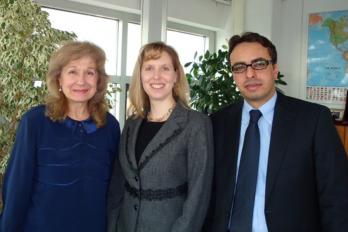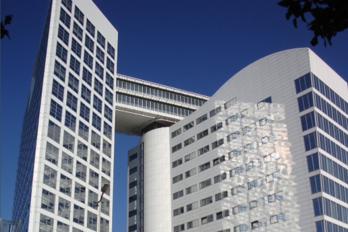Professor Keller Returns from the International Criminal Court
April 2, 2012
On March 30, Professor Linda M. Keller ended her six-month term as a Visiting Professional at the International Criminal Court (ICC) at The Hague, Netherlands.
“My experience gave me a behind-the-scenes perspective on the ICC at a time of major developments at the Court,” Professor Keller noted. Most recently, the Trial Chamber announced its decision in the Lubanga case, the first verdict at the ICC. Thomas Lubanga Dyilo was found guilty of enlisting, conscripting and using children under 15 years of age in a non-international armed conflict in the Democratic Republic of the Congo. Proceedings on sentencing and reparations will follow, along with any potential appeals. “This first trial of the ICC has encountered many difficulties, but that is to be expected from the first permanent international criminal tribunal, which is based on a complex combination of civil law and common law traditions as well as criminal and international law,” said Professor Keller. “Despite the growing pains, the ICC has made tremendous progress over the ten years since its founding.”
Many other “firsts” occurred during Prof. Keller’s time at the ICC. For the first time, a former head of state, Laurent Gbagbo of Côte d’Ivoire, was handed over to the ICC. Pre-Trial Chamber (PTC I) issued the first major decision referring a state party, the Republic of Malawi, to the Assembly of States Parties and the Security Council for failing to cooperate with the ICC; Malawi, like many states before it, did not arrest President Omar Al Bashir of Sudan when he visited Malawi. President Al Bashir is under arrest warrant from the ICC, accused of genocide, war crimes, and crimes against humanity in Darfur. PTC I subsequently referred the state of Chad as well. In a related development, the Prosecutor sought (and recently received) an arrest warrant for another Sudanese governmental official, making it public with the goal of increasing debate over the issue and encouraging increased cooperation by Sudan.
Libya was the first situation unanimously referred to the ICC by the United Nations Security Council and there is an ongoing debate over who will try suspects accused of crimes against humanity by the ICC. First, Libya’s National Transitional Council may attempt to convince the Court that the case against Saif Al Islam Gaddafi is inadmissible at the ICC because Libya is ready, willing, and able to try Gaddafi itself. “Gaddafi’s son Saif is at least nominally in the custody of Libya,” Professor Keller explained. “Gaddafi’s intelligence chief, Abdullah al-Senussi, was arrested in Mauritania in mid-March. The ICC, Libya and France are all asking Mauritania for custody of al-Senussi based on various charges.”
In a high-profile development outside the Court, San Diego-based Invisible Children launched “Kony 2012,” an online video that went viral and sparked widespread discussion over both Kony’s Lord’s Resistance Army militia and Invisible Children’s campaign. “Joseph Kony has been wanted by the ICC for charges of war crimes and crimes against humanity since 2005. I think that bringing attention to Kony’s alleged atrocities is a good thing, regardless of potential flaws in the Kony 2012 campaign,” said Professor Keller.
Along with everyone at the ICC, Professor Keller followed closely the election of new ICC judges and a new Prosecutor, Fatou Bensouda of the Gambia, currently Deputy Prosecutor. Professor Keller was at the ICC while PTC I, over the dissent of the Presiding Judge, declined to confirm charges due to lack of sufficient evidence and released Callixte Mbarushimana, accused of war crimes and crimes against humanity in the Democratic Republic of the Congo. During the last six months, four new countries joined the ICC, with Cape Verde, the Maldives, the Philippines and Vanuatu bringing the total of States Parties to 120.
As a Visiting Professional in the chambers of PTC II Presiding Judge Ekaterina Trendafilova, Professor Keller spent much of her time working on the Kenya cases. “I was very fortunate that Judge Trendafilova and her Legal Officer, Mohamed M. El Zeidy, gave me the opportunity to contribute to the work of the Kenya team,” Professor Keller stated.
The hearings on the confirmation of charges were wrapping up as Professor Keller joined the Chambers in October. She arrived just in time to tackle the thousands of pages of evidence related to charges against six suspects. The Prosecutor, in his first exercise of his power to initiate a case on his own with PTC approval, brought two cases.
The first case alleged that prominent politicians William Ruto and Henry Kosgey, with contributions from media announcer Joshua Sang, committed the crimes against humanity of murder, deportation or forcible transfer, and persecution in the aftermath of the disputed 2007 Kenyan presidential elections. Case 1 alleged that the suspects, connected to the Orange Democratic Movement (ODM), targeted perceived supporters of their political opponents, the Party of National Unity (PNU).
Case 2 alleged that key supporters of the PNU engaged in retaliatory attacks that amounted to the crimes against humanity of murder, deportation or forcible transfer, rape and other forms of sexual violence, persecution, and other inhumane acts. The Case 2 suspects included Francis Muthaura, until recently Head of the Public Service and Secretary to the Cabinet; Uhuru Kenyatta, Deputy Prime Minister, son of Kenya’s first president, and until recently Minister of Finance; and Mohammed Hussein Ali, former Commissioner of Police. “As you can imagine from those involved, this is a very high profile case in Kenya,” said Prof. Keller.
On January 23, 2012, PTC II released the decisions on the confirmation of charges in both cases simultaneously, to avoid potentially violent reactions if it were perceived that only one side was being targeted by the ICC. Presiding Judge Trendafilova also delivered an oral summary of the decision so that Kenyans and others could learn the outcome (without reading the 170+ page, highly technical legal decisions). The amount of interest was so great that the ICC website crashed. (The PTC II presentation of the decision is available on the ICC’s YouTube channel. In the confirmation of charges decision, PTC II, by majority, confirmed some of the charges and declined to confirm others.
Specifically, in Case 1, it concluded there was sufficient evidence to establish substantial grounds to believe that the crimes against humanity of murder, deportation or forcible transfer, and persecution regarding specified dates and locations against defendants Ruto and Sang. It found the Prosecutor failed to show substantial grounds to believe that Kosgey was involved in the crimes alleged. In Case 2, PTC II also confirmed charges against two defendants and declined to confirm charges against the third. Specifically, it found sufficient evidence to establish substantial grounds to believe that Muthaura and Kenyatta are responsible for all the alleged crimes against humanity, while finding that there was insufficient evidence against Ali.
“The ramifications of this decision may extend beyond these six accused,” Professor Keller noted. “Two of the defendants against whom charges are confirmed, Ruto and Kenyatta, are leading candidates for the upcoming presidential elections; it remains to be seen if or how the decision may eventually effect their campaigns for higher office and the elections overall. Fortunately, despite dire predictions by some, there has been no widespread violence in Kenya in reaction to the decision.”
A confirmation of charges decision does not decide guilt or innocence, but merely determines whether there is enough evidence to go to trial. Four of the Kenya suspects are committed to a Trial Chamber for trial, though they are also appealing the PTC decision on jurisdiction. As for the charges not confirmed, the Prosecutor may put forward additional evidence and request confirmation in the future.
“I look forward to sharing what I’ve learned with the TJSL community,” said Professor Keller. “I’m grateful to the ICC, and particularly Judge Trendafilova, for the opportunity.”

